Alice Oswald Series: A Nature Poet, Carving Sound
In the first of a series of pieces on our 2017-18 Writer in Residence Alice Oswald, Seren and Melissa paint us a picture of her life and work.
One of Britain’s foremost living nature poets, Alice Oswald was born in 1966 in Reading, Berkshire. Studying Classics at Oxford University, she went on to become a gardener, following in the footsteps of her mother, who was a well-respected garden designer.
Alice became a full-time poet following the publication of her first poetry collection, The Thing in the Gap-Stone Stile (1996), which she worked on in between her working hours. Alice currently resides in Devon with her husband, Peter Oswald, along the river Dart, the subject of her award-winning poem Dart (2002). Both her previous work in horticulture and study of Classics can be see as clear influences in her poetry, with natural imagery and homage to Classical writing showing up repeatedly in her work.
Alice’s work did not take long to be noticed by literary critics, as her first collection The Thing in the Gap-Stone Stile earned her a Forward Poetry Prize in the year it was published, and was shortlisted for the T.S. Eliot Prize the year after. Since then, Alice has solidified her place as a poet with works like the T.S. Eliot Prize-winning Dart, the Ted Hughes Award Recipient Weeds and Wild Flowers (2009), and her latest work, the 2016 Costa Award recipient and 2017 Griffin Poetry Prize Winner Falling Awake (2016).
Her poetry has been found to draw from writers like Ted Hughes and Homer, the latter having, for example, inspired her critically acclaimed poem Memorial (2011). Memorial is a retelling of The Iliad (762 B.C., estimated), in which Alice remembers those who, in Greek mythology, lost their lives in the Trojan War. Alice describes it as ‘as a series of memories and similes laid side by side’ and ‘a kind of oral cemetery’, and it is: the poem starts by listing the name of those who died, before going into almost biographical stanzas. As a true nature poet, Alice offers us a remembrance of the dead interlinked in nature, like in the stanza:
Like when two winds want a wood
The south wind and the east wind
Both pull at the trees’ arms
And the sound of smooth‐skinned cornel whipping to and fro
And oak and ash batting long sticks together
Is a word from another world
Although Alice is reluctant to take up the title of being a ‘nature poet’, having previously said that ‘I’m not a nature poet, but I admit, I do love the company of plants’, most, if not all, of her poems contain some element of the natural in them. Poems such as Dart and collections like Woods, etc are explicit in their use of natural imagery, but even her most recent collections, Memorial and Falling Awake, works not based around the pastoral, can be keenly linked to nature poetry.
What differentiates Alice from traditional Romantic nature poets such as Blake and Wordsworth is that these natural elements are not romanticised in the same way. Rather, her poems often contain elements of death and decay, and aren’t afraid of shying away from the darker side of the pastoral. In her poem ‘Woods etc.’ in the collection of the same name, she displays darker imagery in her description of the natural, like:
I remember walking once into increasing
woods, my hearing like a widening wound.
first your voice and then the rustling ceasing.
the last glow of dead rain on the ground
Alice’s writing is also strongly established in the oral tradition of poetry. She is known for taking as much care as to how her poetry sounds aloud as to how it’s written on paper. Describing her writing as ‘sound carvings’, she has said that ‘I originally took to reading my poems out loud because I found people didn’t read the tunes properly on the page’. One of her poems in the collection Falling Awake, ‘Tithonus’, was specifically written to be read aloud in 46 minutes in perfect timing with the dawn of the sun. This type of meticulous attention Alice pays to the performance of her poetry shows her classical influence in the tradition of Homer, whose poems were entirely spoken-word.
Alice is currently Poet-in-Residence for BBC Radio 4, as well as new Writer-in-Residence for Falmouth University for 2017-18. With us, she will be leading workshops where students can hone their poetry skills with one of the living greats.
By Seren Livie and Melissa Saryazdi






